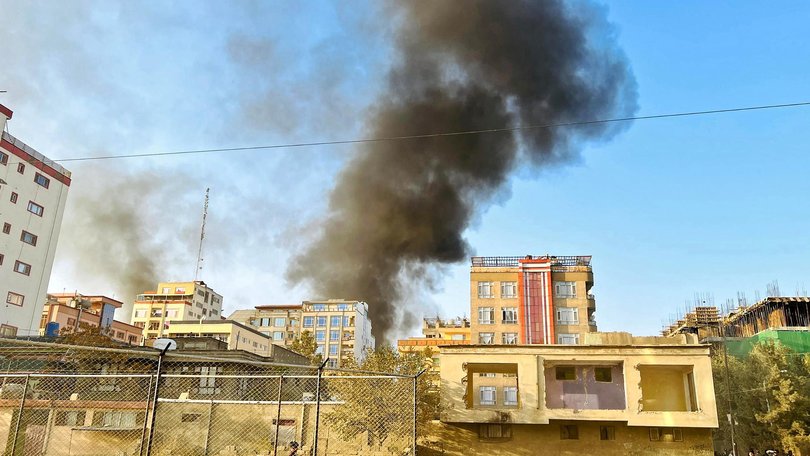Afghanistan and Pakistan announce ceasefire after a week of deadly clashes
Both nations announced the ceasefire after a week of deadly clashes along their border and strikes on the Afghan capital threatened to spill into a broader conflict.

Afghanistan and Pakistan announced a ceasefire between their militaries on Wednesday, in a bid to defuse tensions after a week of incendiary rhetoric and deadly clashes along their border and strikes on Kabul, the Afghan capital, threatened to spill into a broader conflict.
The ceasefire, announced by both governments, took effect hours after at least 12 Afghan people were killed and more than 100 others were wounded in fighting near the two main border crossings between the two countries.
A Pakistani security official, an Afghan official and a military officer, all speaking on condition of anonymity because they weren’t allowed to discuss the ongoing tensions publicly, said that Pakistan had carried out strikes in Kandahar shortly before the ceasefire was announced. The Pakistani official and the Afghan government official also said that Pakistan’s military had struck Kabul, where explosions were heard.
Sign up to The Nightly's newsletters.
Get the first look at the digital newspaper, curated daily stories and breaking headlines delivered to your inbox.
By continuing you agree to our Terms and Privacy Policy.In a statement, Pakistan’s Ministry of Foreign Affairs said both sides would respect a 48-hour ceasefire and favour dialogue. Afghanistan also “instructed all its forces to observe the ceasefire,” Zabiullah Mujahid, a spokesperson for the Afghan government, said in a similar statement.
Relations between Afghanistan and Pakistan have dropped in recent weeks to their lowest point since the Taliban takeover of Afghanistan in 2021. On Sunday, Afghan forces attacked Pakistani military outposts along the border in what they said was retaliation for airstrikes in Afghanistan last week that Kabul has blamed on Pakistan.
Both sides claimed dozens of casualties; they stopped fighting after Qatar and Saudi Arabia urged restraint.
But border crossings have since remained closed, and in the early hours of Wednesday fighting erupted again near the two main border crossings between Afghanistan and Pakistan.
Both sides accused each other of attacking first.
Mujahid, the Taliban spokesperson, said a Pakistani attack that included artillery had killed 12 people and wounded 100 others. Pakistan’s military said it had responded to an Afghan attack.
The fighting took place in the Spin Boldak border area of southern Afghanistan and central Pakistan, according to Pakistani and Afghan officials, and near the Torkham border crossing, hundreds of miles north.
Residents on the Afghan side of the border in Spin Boldak said in telephone interviews that explosions and the sound of heavy artillery had woken them in the middle of the night. The fighting later reached the area’s border crossing point and a market, sending residents fleeing to nearby Kandahar, one of Afghanistan’s largest cities and the residence of the country’s leader, Sheikh Hibatullah Akhundzada.
Noorullah Khatab, a construction engineer in Spin Boldak, said he had heard explosions around 3am and had rushed back to his home in Kandahar later in the morning when he saw dozens of ambulances transporting the wounded from the border to the city.
“The firing continued until morning,” he said. “I couldn’t sleep at all.”
The Pakistani military also accused Afghan forces of attacking Pakistani border posts near the Torkham border crossing, in the northern Pakistani region of Khyber Pakhtunkhwa.
But a spokesperson for the governor’s office of Khost province in Afghanistan, on the other side of the border, accused Pakistani forces of opening fire in the early hours of Wednesday. The spokesperson, Mustaghfir Gurbaz, accused Pakistani forces of killing a journalist and injuring another from Afghanistan’s public broadcaster hours after the fighting stopped.
The fighting Wednesday further escalated tensions that began last week when at least two explosions rocked Kabul’s downtown and an airstrike hit a market near the border, according to Afghan officials who accused Pakistan of violating Afghanistan’s sovereignty and striking at the border.
Pakistan has neither publicly confirmed nor denied responsibility for the attacks.
The Afghan army attacked Pakistani border posts Saturday, killing at least 23 soldiers and injuring 29 others, according to the Pakistani military. The Taliban government, which said it had carried out the attacks in response to the strikes days earlier, said nine Afghan soldiers had died and at least 16 others had been injured.
Pakistan has accused the Taliban government of harbouring militant groups that have killed hundreds of Pakistani security forces in recent years. Afghanistan has denied the accusations, even as many analysts, including independent United Nations experts, have pointed out that the banned group Tehreek-e-Taliban Pakistan, also known as the TTP or Pakistani Taliban, has received financial support from the Afghan government, and that its militants have trained freely in Afghanistan.
This article originally appeared in The New York Times.
© 2025 The New York Times Company
Originally published on The New York Times
